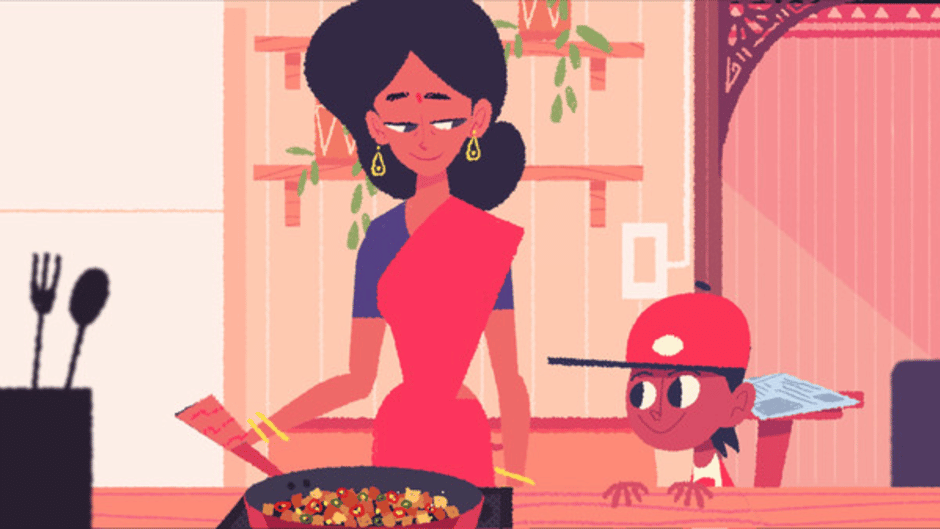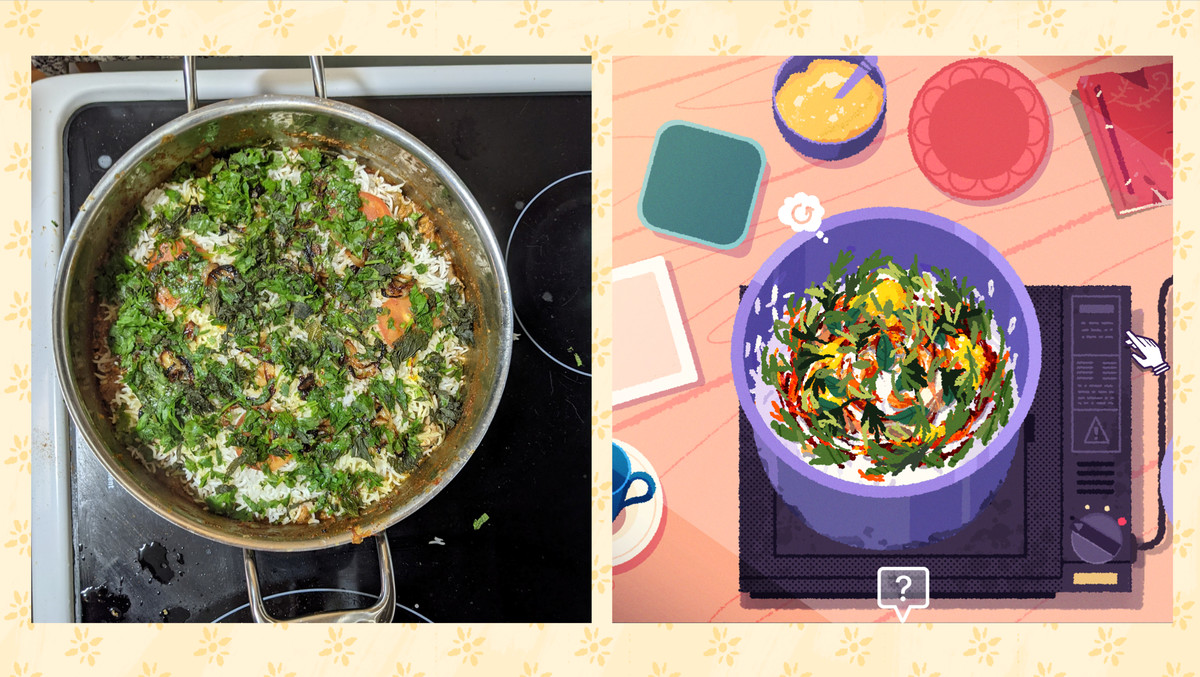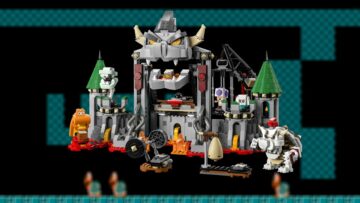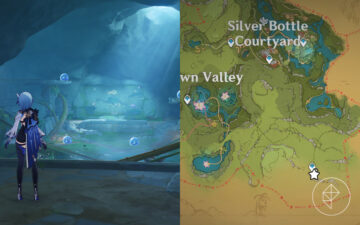You might not immediately think of sound as one of the senses essential in cooking. Taste and smell, of course, are obvious, but there’s also the saying that you eat first with your eyes, too. In a cooking video game like Venba, you’re reduced down from those essential senses — there’s no way to taste, smell, or feel the food on screen — leaving only sight and sound. It’s in situations like these that you realize just how important the sounds of the kitchen are: the way garlic sizzles in oil, or how dumplings hiss with steam. A video game about cooking must pull on these sense memories to entice the player.
Venba is described as a narrative cooking game centered on an Indian family that immigrated to Canada from Tamil Nadu in the ’80s. You play as Venba, a mother and wife who is using food to connect her family members back to their heritage and, in turn, restoring lost family recipes. It’s one part visual novel and one part cooking game, all the ingredients adding up to a story Visai Games says centers on “family, love, loss, and more.”

During a preview hosted last week, Venba game designer Ahbi gave media a peek at the game’s narrative and cooking game elements, but also described how the studio built a realistic sound for all the recipes in the game. Ahbi said the entire team committed to cooking all Venba’s recipes multiple times through. “It was a huge source of reference for the art and the sound,” Ahbi said. He noted that Tamil cuisine is not always the food that comes to mind when someone thinks of Indian food; northern Indian cuisine is more common in North America.
“It’s something I was very excited to showcase in Venba, but it comes with a double-edged sword because it comes with a lot of pressure to show this with a lot of authenticity and to do it properly, because people are counting on these recipes to be accurate. When Venba found a wider audience, we felt that responsibility very deeply.”
The cooking rule — that the team members would follow these recipes themselves — was key to making sure everyone understood the taste, texture, and, yes, sound, of southern Indian food. “Capturing the recipes accurately was important to us, and so was making the players feel like they were stepping inside Tamil kitchen,” Ahbi said. “For that, the sound design plays a very important role.”
That task was put to Venba sound designer Neha Patel, who not only cooked the meals, but recorded sound each step of the way. “It’s not that we wanted to make foley, necessarily, but […] it was really hard to capture these specific sounds, and there’s not a lot of existing libraries out there,” Abhi said. “Neha felt that foley was the only way to do it properly.”

Ahbi showed press how this worked in side-by-side videos depicting the recording of, say, oil crackling and sputtering alongside in-game clips of frying foods. The way it was recorded required almost no editing on Visai Games’ part; the sound was able to be laid right over the in-game footage “like it was scored for this,” Ahbi said.
Beyond foley for cooking, Ahbi described the lengths the team went to to create the essential background of Tamil cooking — especially the music on the radio. He recalled there being nary a quiet moment in his family kitchen, with radio or the TV often playing in the background. Visai Games added an in-game radio with a soundtrack scored alongside the different narrative eras tied to the sounds of Tamil cinema from the aligned decade. “In fact, it’s even more specific,” Ahbi said. “It’s designed to sound like a specific composer’s song. The songs are homages to specific music directors who we were all fans of growing up. Depending on the level and the time period, the era will change with the music and song styling.” That includes a song from a music director named Devanesan Chokkalingam, or Deva, a man who has composed music for hundreds of films and for nearly 40 years. They were planning on doing a song inspired by his music, and he said he’d do it himself.
Venba ended up with music recorded live, sung by various South Asian artists, and composed by Alpha Something. “It’s pretty rare for games, but even rarer for indie games,” Ahbi said. “But to recreate those styles of music, we needed live instruments that were signatures for different music directors.”
- SEO Powered Content & PR Distribution. Get Amplified Today.
- PlatoData.Network Vertical Generative Ai. Empower Yourself. Access Here.
- PlatoAiStream. Web3 Intelligence. Knowledge Amplified. Access Here.
- PlatoESG. Automotive / EVs, Carbon, CleanTech, Energy, Environment, Solar, Waste Management. Access Here.
- BlockOffsets. Modernizing Environmental Offset Ownership. Access Here.
- Source: https://www.polygon.com/23793949/venba-preview-cooking-game-tamil-cuisine
- :has
- :is
- :not
- $UP
- 40
- a
- Able
- About
- accurate
- accurately
- added
- adding
- aligned
- All
- alongside
- Alpha
- also
- always
- america
- an
- and
- ARE
- Art
- Artists
- AS
- asian
- At
- audience
- authenticity
- back
- background
- BE
- because
- being
- between
- built
- but
- by
- Canada
- capture
- captures
- centered
- Centers
- change
- Cinema
- clips
- comes
- committed
- Common
- comparison
- composed
- Composer
- Connect
- cooked
- cooking
- counting
- course
- create
- decade
- Depending
- depicting
- described
- Design
- designed
- Designer
- different
- Director
- Directors
- do
- doing
- down
- each
- eat
- elements
- Entire
- Era
- especially
- essential
- Ether (ETH)
- Even
- everyone
- excited
- existing
- Eyes
- fact
- family
- family members
- fans
- feel
- films
- First
- follow
- food
- foods
- For
- found
- from
- game
- Games
- gave
- Growing
- Hard
- he
- her
- heritage
- his
- hosted
- How
- HTTPS
- huge
- Hundreds
- i
- immediately
- important
- in
- in-game
- includes
- Indian
- Indie
- inside
- inspired
- instruments
- IT
- just
- Key
- Last
- leaving
- Level
- libraries
- Life
- like
- live
- looking
- loss
- lost
- Lot
- love
- make
- Making
- man
- meals
- Media
- Members
- Memories
- might
- mind
- moment
- more
- mother
- multiple
- Music
- must
- Named
- NARRATIVE
- nearly
- necessarily
- needed
- no
- North
- north america
- noted
- novel
- obvious
- of
- often
- Oil
- on
- ONE
- only
- or
- out
- over
- part
- People
- period
- planning
- plato
- Plato Data Intelligence
- PlatoData
- Play
- player
- players
- playing
- plays
- Polygon
- pot
- press
- pressure
- pretty
- Preview
- properly
- put
- Radio
- RARE
- realistic
- realize
- really
- Recipes
- recorded
- recording
- Reduced
- reference
- required
- responsibility
- restoring
- Rice
- right
- Role
- Rule
- s
- Said
- say
- saying
- says
- Screen
- sense
- show
- showcase
- showed
- side
- Sight
- Signatures
- situations
- Smell
- So
- Someone
- something
- son
- song
- songs
- Sound
- soundtrack
- Source
- South
- Southern
- specific
- Steam
- Step
- stepping
- Story
- studio
- sung
- sure
- Task
- taste
- team
- Team members
- that
- The
- their
- themselves
- There.
- These
- they
- Think
- Thinks
- this
- those
- Through
- Tied
- time
- times
- to
- too
- TURN
- tv
- understood
- us
- using
- various
- very
- Video
- video game
- Videos
- wanted
- was
- Way..
- we
- webp
- week
- went
- were
- when
- WHO
- wider
- wife
- Wikipedia
- will
- with
- worked
- would
- years
- yes
- you
- Your
- zephyrnet








